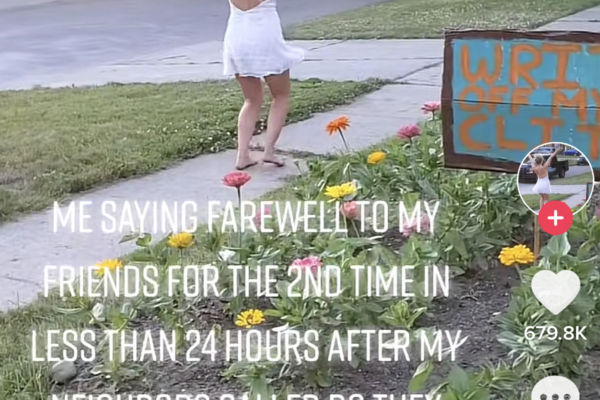Seeing her constitutional right to an abortion wiped out by the U.S. Supreme Court this summer, Amanda Carravallah responded by leaning into a right she still retained: free speech.
In both respects, she has an ally in the ACLU of Michigan.
After the Supreme Court overturned Roe v. Wade in June, Ms. Carravallah felt compelled to speak out in support of abortion rights. She attended a rally in Detroit to protest the decision, but felt that wasn’t enough. Wanting to send an emphatic message, she erected several pro-abortion lawn signs in her front yard. The language used was blunt, and some signs included profanity—accurately reflecting the depth of Ms. Carravallah’s indignation at having her right to bodily autonomy stripped away from her by judicial decree.
With hand-made protest signs like “Abort the Court” planted among the colorful flowers sprouting in her front yard, she danced joyfully in front of her house to a variety of musical selections, all while wearing a bikini and other revealing clothing as an expression of control over her own body. One of the songs playing on a loop was Carry Anne, with the lyric, “This is my pussy, I can do what I want.”
When she posted videos of all this on TikTok, they caught fire. Some of her neighbors, however, were less than amused. Police were called three times over a 24-hour period. But Ms. Carravallah knows the law, and didn’t play the music loud enough to warrant a noise-ordinance infraction. And the lawn signs and lyrics, of course, were protected speech under the First Amendment. The police, reluctantly but correctly, did not stop Ms. Carravallah’s protest.
Undeterred, one of the neighbors sought and obtained a personal protection order (PPO) that, among other things, prohibited Ms. Carravallah from being anywhere the neighbor could see her. It was essentially an attempt to have Ms. Carravallah placed under something akin to house arrest.
That is when the ACLU of Michigan became involved. Along with cooperating counsel Allison Kriger and Mark Kriger, private practice criminal defense attorneys based in Detroit, we represented Ms. Carravallah in court, arguing that the PPO had no legal justification, and her activity was fully protected by the First Amendment.
An Oakland County Circuit Court judge agreed with us, and the PPO was terminated.
The First Amendment’s protection of free speech was upheld. Still hanging in the balance, though, is the issue that drove Ms. Carravallah to protest in the first place: the fundamental right to an abortion.
Protecting Abortion Rights
Michiganders will have a chance to re-affirm that right when they vote in the upcoming election. Led by the ACLU of Michigan and our coalition partners, Reproductive Freedom for All collected a record number of signatures over the summer to place Proposal 3 on the Nov. 8 ballot.
If Proposal 3 passes, it will keep in place the protections established in the Roe v. Wade decision nearly 50 years ago. It is a common-sense measure that reflects what polls show to be the desire of most Michiganders: keeping abortion in our state safe and legal.
Unfortunately, special and religious interests with deep pockets are trying to defeat Prop 3 by spreading disinformation and sowing confusion about what it will actually do.
You’ve probably seen some of their attack ads.
Although the Yes on Proposal 3 campaign might not be able to match the other side’s profuse spending, it does have something they don’t: the momentum and passion of a grassroots network of supporters committed to reclaiming the rights that were cruelly denied to them by the politicized Supreme Court.
You can do your part to help pass Prop 3 by contacting three people you know and getting them to commit to voting for it. Then go and vote for it yourself. If you’d like to do even more, we need your help, from knocking on doors to making phone calls to potential voters. Sign up to volunteer now by going to the RFFA website.
With absentee voting already underway, we must act with urgency. And we can draw inspiration from Ms. Carravallah, who told the Daily Kos this when interviewed for a story about her protest:
“No more business as usual. If women and girls in this country are losing their basic right to medical freedom and 10-year-old girls are being shuffled out of Ohio to get abortions after they were raped, as a sexual assault survivor, that’s a hard no for me.”
And a resounding “yes” to Prop 3, which will protect reproductive rights in Michigan for generations to come, and provide a history-making model other states can follow as they navigate the new legal landscape created by the overturning of Roe v. Wade.
Phil Mayor, a senior staff attorney for the ACLU of Michigan, worked on Amanda Carravallah’s case.


